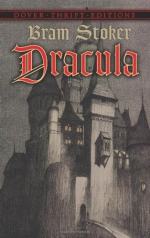The coastguard on duty at once made report, and one old fisherman, who for more than half a century has kept watch on weather signs from the East Cliff, foretold in an emphatic manner the coming of a sudden storm. The approach of sunset was so very beautiful, so grand in its masses of splendidly coloured clouds, that there was quite an assemblage on the walk along the cliff in the old churchyard to enjoy the beauty. Before the sun dipped below the black mass of Kettleness, standing boldly athwart the western sky, its downward way was marked by myriad clouds of every sunset colour, flame, purple, pink, green, violet, and all the tints of gold, with here and there masses not large, but of seemingly absolute blackness, in all sorts of shapes, as well outlined as colossal silhouettes. The experience was not lost on the painters, and doubtless some of the sketches of the ‘Prelude to the Great Storm’ will grace the R. A and R. I. walls in May next.
More than one captain made up his mind then and there that his ‘cobble’ or his ‘mule’, as they term the different classes of boats, would remain in the harbour till the storm had passed. The wind fell away entirely during the evening, and at midnight there was a dead calm, a sultry heat, and that prevailing intensity which, on the approach of thunder, affects persons of a sensitive nature.
There were but few lights in sight at sea, for even the coasting steamers, which usually hug the shore so closely, kept well to seaward, and but few fishing boats were in sight. The only sail noticeable was a foreign schooner with all sails set, which was seemingly going westwards. The foolhardiness or ignorance of her officers was a prolific theme for comment whilst she remained in sight, and efforts were made to signal her to reduce sail in the face of her danger. Before the night shut down she was seen with sails idly flapping as she gently rolled on the undulating swell of the sea.
“As idle as a painted ship upon a painted ocean.”
Shortly before ten o’clock the stillness of the air grew quite oppressive, and the silence was so marked that the bleating of a sheep inland or the barking of a dog in the town was distinctly heard, and the band on the pier, with its lively French air, was like a dischord in the great harmony of nature’s silence. A little after midnight came a strange sound from over the sea, and high overhead the air began to carry a strange, faint, hollow booming.
Then without warning the tempest broke. With a rapidity which, at the time, seemed incredible, and even afterwards is impossible to realize, the whole aspect of nature at once became convulsed. The waves rose in growing fury, each over-topping its fellow, till in a very few minutes the lately glassy sea was like a roaring and devouring monster. White-crested waves beat madly on the level sands and rushed up the shelving cliffs. Others broke over the piers, and with their spume swept the lanthorns of the lighthouses which rise from the end of either pier of Whitby Harbour.




